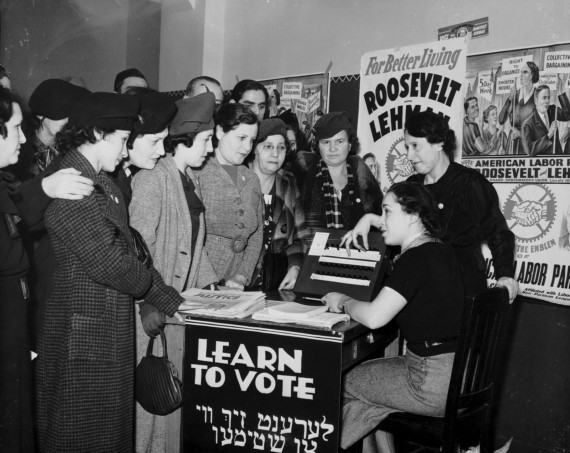| Peter Stuyvesant |
| James Oglethorpe |
An topical blog tracking trends and fads in American Jewish foodways
Relationships and community may represent both the greatest opportunity for loss and the most appealing opportunities for gain in becoming more traditionally observant.Green goes on to discuss that baalei teshuvah often gain a strong sense of community that stands in contrast from the surrounding, secular American culture, but they often have to work diligently if they are to remain close with their families and communities of origin. This reminded me of a cousin who became baalat teshuva later in life (she was probably early 30s when she became orthodox) and had a lot of trouble meeting a husband because she was "old" for the community she was entering. Simultaneously, it was very hard for her parents to adjust to her new life... Do any of you have stories like this in your families or extended families? In what ways do you think involvement in Reform communities may also represent an opportunity for gain or for loss? How can we make sure that participation and collaboration with our communities lands more often on the side of gain than the side of loss?

Brown University is investigating anti-gay and anti-Semitic graffiti found in a campus building that houses a Jewish fraternity and a fraternity with many LGBTQ members.For those who may not have heard, Beta Rho Pi is formerly Alpha Epsilon Pi, Beta Rho chapter, and my college fraternity. The undergraduate brothers disaffiliated from the national fraternity earlier this year. (That process and that story, in itself, could be a useful topic for further exploration with respect to the challenges of fraternities as uniquely American Jewish institutions...)
President Christina Paxson in an email Friday to the Brown community said campus police will investigate the incident at Marcy House.
The graffiti was discovered early Friday morning scrawled across the house's walls.
A university spokesman tells the Providence Journal that Beta Rho Pi, a Jewish fraternity, and Zeta Delta Xi, a co-ed fraternity with many LGBTQ members, live in the house.
A speech by a writer and transgender advocate scheduled for March 21 at the Ivy League school had been canceled Wednesday amid controversy. An online petition accused the co-sponsor, Brown RISD Hillel, of defending "Israeli state's policies of occupation and racial apartheid.




The Sanders campaign is providing the backdrop for a mass Jewish psychodrama of wrenching, deeply depressing proportions. Sanders is serving as a passive canvas onto which we are projecting a startling array of our saddest insecurities, neuroses and self-delusions.
It might not be a Judaism that’s particularly gratifying to those of us who take our Judaism — Jewish learning, Jewish practice, Jewish fidelity — very earnestly. But it is the Judaism of the great majority of American Jews, millions of them.b.) He represents the enduring tensions between the anxieties of standing out vs. political passivity.
c.) What is at stake for the American Jewish community when it confronts a public persona that represents "assimilation"? I.e: Is the community more comfortable with a Joe Lieberman or a Bernie Sanders?The article talks about a 2008 open letter from Jewish senators, of which Sanders was a signatory, condemning negative emails about Barack Obama that were specifically sent to the Jewish community:The letter is historic for a single reason: It is the first time in history that any Jewish senators signed a public statement that included the words “As Jewish United States Senators.” Customarily... Jewish senators avoid such statements because they see themselves as representing all the people of their state, not the small Jewish minorities.... This was the first time a group of Jewish senators felt compelled to speak out “as Jewish United States Senators” to their fellow Jews while the rest of the world looked on.
Those of us who do live fully in our Jewish skins tend to judge those who don’t as wanting. We think they’ve failed in their duties, or walked away... This is what gets projected onto public figures who are outstanding in their chosen fields but ordinary Jews in their private lives.... Think of the abuse Bob Dylan has taken over the years because his Jewish self didn’t meet our needs. Now look again at Bernie Sanders.
Sanders’ Judaism — looking to the Holocaust as a paradigmatic Jewish experience and learning from it that people need to be kind to each other — is utterly typical of the Judaism experienced by the majority of American Jews. It’s a Judaism that’s not fluent in Talmud and doesn’t touch the Jew’s every waking hour. It’s humble, imperfect, not worn on the sleeve.
Mr. Sanders, those who know him say, exemplifies a distinct strain of Jewish identity, a secular offshoot at least 150 years old whose adherents in the shtetls of Eastern Europe and the jostling streets of the Lower East Side were socialists, anarchists, radicals and union organizers focused less on observance than on economic justice and repairing a broken world.The description of the lower east side socialists made me think of the role these women took in their community and the economic life of their local society.
Welch's for Pesah? " Welch's Teams With Manischewitz in Battle Over Kosher Grape Juice " (NPR, 10/10/17)
